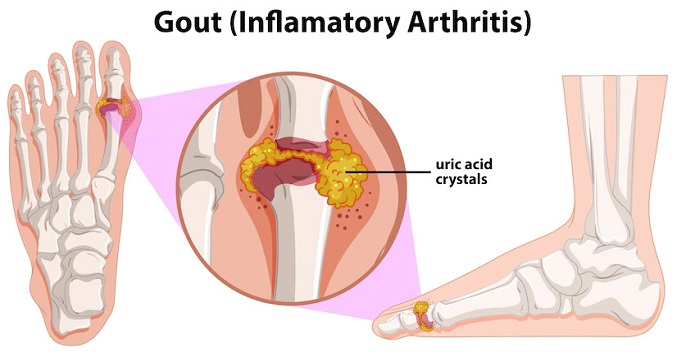In this article, you will learn how uric acid wreaks havoc on our bodies if left unchecked.
In this article, you will learn how uric acid wreaks havoc on our bodies if left unchecked.
You are here, reading this article, aren’t you? That means you may have a clue as to how uric acid damages our bodies, or, God forbid, you or your loved ones might be facing the repercussions. Uric acid has been in the shadows for far too long. Not many people know about this. That makes it all the more important to talk about it.
Uric acid comes from only three sources: fructose, alcohol, and purines. While you may know about fructose and alcohol, purines might be a new term for you. Let me help you understand it. Purines are natural organic substances found in our body where they serve important functions and help form our body’s core genetic material- DNA and RNA. They affect blood flow, heart function, inflammatory and immune responses, the experience of pain, digestive function, and the absorption of nutrients. Some purines even act as neurotransmitters and antioxidants.
Now, a question may arise. How can a substance which serves so many important functions in our body lead to the formation of a compound which causes so many problems? Our kidneys, when functioning properly, can excrete uric acid out of our body through urine. But if the amount of purines becomes too excessive and our body cannot keep up with processing them, too much uric acid builds up which then leads to a cascade of problems. Some of them are:
1. Gout
In gout, which is a metabolic disease, excess uric acid erodes bone tissues and forms sharp, needlelike mineral crystals (urate) in the joints, which causes inflammation and pain, sometimes severe. Gout notoriously strikes the bunion joint in the big toe. During a gout attack, symptoms in the affected joint may include:
Intense pain.
Redness.
Stiffness
Swelling.
Tenderness, even to light touch, such as from a bedsheet.
2. Raises Blood Pressure
High uric acid sets off a cascade of biochemical reactions, collectively called oxidative stress, which constricts blood vessels. In turn, blood pressure rises as the heart is forced to pump harder to circulate blood.
Secondly, when there’s an unrelenting surplus of uric acid, lasting injury and inflammation in the kidneys can occur, which makes them less able to do their job and excrete salt. This salt retention further contributes to rising blood pressure, as that extra salt in the bloodstream pulls water into our blood vessels, increasing the total amount (volume) of blood inside them. And with more blood flowing through our blood vessels, the pressure inside them increases
3. Can lead to Erectile Dysfunction
Excess uric acid damages the inside lining of blood vessels, the endothelium, via inflammation and oxidative stress. This reduces the activity of nitric oxide, which is necessary for erectile function.
Nitric oxide (NO) is produced naturally by our body, and it’s important for many aspects of our health. Its most vital function is vasodilation, meaning it relaxes the inner muscles of the blood vessels, causing them to widen and increase circulation. Uric acid affects nitric oxide activity, which in turn, affects blood flow, reducing erectile function. In fact, ED drugs like Viagra and Cialis work by increasing nitric oxide.
4.Uric acid triggers fat production, from thickening our waistline to filling our liver with dangerous fat.
Excess uric acid signals the body to store fat, instead of burning it. The enzyme, uricase, which is responsible for converting uric acid into other substances, has been mutated with evolution. It served as a precautionary measure in the past as food was scarce. It allowed us to store more fat when food was in abundance and helped us to survive in times of famine.
But, with modern evolution, food is available to us at all times. We no longer need to hoard food in the form of fat. But the switch has remained the same, which is causing our bodies to become obese.




Comments
Post a Comment